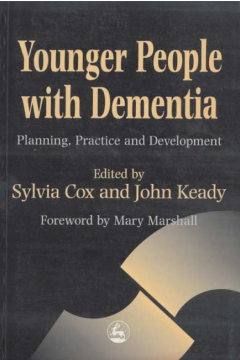
Additional Information
Book Details
Abstract
Despite the growth of interest in dementia and dementia care over the past two decades, services and interventions for younger people with dementia and their carers remain, on the whole, fragmented and poorly developed. The focus of social, psychological and biomedical research has been almost exclusively on older people and their carers.
The first book to address the subject in its own right, Younger People with Dementia addresses good practice and stimulates an agenda for change. The contributors explore the implications for younger people with dementia and their families at personal, planning and service-development levels. Arguing that information from the wide range of existing practice and clinical knowledge can be shared and built upon, the contributors call for a collaborative, interprofessional and multi-disciplinary approach to all stages of the provision of services.
This book is not one to be just read. Because of its academic nature it is to be studied, discussed with colleagues and used as a reference tool. It embraces medical, sociological and psychological approaches in addressing and understanding the particular needs of persons with younger onset dementia. "Younger" is defined as being anyone under the age of 65, and particularly those in their third, fourth, fifth and sixth decade. In addition to scholarly essays, there are also many accounts from people with dementia as well as their caregivers…What we especially like about this book is the collaborative effort of various disciplines from several countries. As it is not limited to national boundaries, it gives a window into writings and practices from around the world…The result is an impressive and informative book from which all of us working in the Alzeimer's community can benefit. Sylvia Cox and John Keady are to be commended for taking on the task of editing this excellent book…This is a timely book that argues that "information from the wide range of existing practice and clinical knowledge can be shared and built upon; the contributors call for a collaborative, interprofessional and multidisciplinary approach to all stages of the provision of services." This they have accomplished with their contributions to this book.
Early Alzheimer's
One of the joys of book reviewing is that occasionally one is offered a book that gets everything right. Younger People with Dementia is such a book. The subject matter is of increasing concern and this treatment is timely. The book is well produced by a specialist publisher. Its contributors contribute readable English, with a notable absence of jargon. Both editors have written widely on the subject themselves and have chosen and ordered the contributors with great care. An impressive bibliography is also included.
Community Practitioner
This is the first book to address the subject in its own right. The contributors explore the implications for younger people and their families at personal, planning and service development levels. The contents are very necessary reading for all those concerned in dementia care and raise important interprofessional issues…The book is very well referenced, giving many suggestions for further reading on particular subjects. The style is clear and readable throughout. In my own opinion the book is essential reading for all concerned with providing care for younger people with dementia.
Journal of Interprofessional Care
This volume of writing is extremely timely and benefits from the substantial dementia care practice, research and service evaluation experience of the editors, Sylvia Cox and John Keady. Recommended reading for service planners everywhere.
Signpost Reviews
Table of Contents
| Section Title | Page | Action | Price |
|---|---|---|---|
| COVER | Cover | ||
| Younger People with Dementia:\rPlanning, Practice and Development | 3 | ||
| Contents | 5 | ||
| ACKNOWLEDGEMENTS\r | 8 | ||
| Foreword | 9 | ||
| Introduction | 11 | ||
| PART ONE: SETTING THE\rSCENCE | 15 | ||
| 1. Assessment and Service Responses\rfor Younger People with Dementia:\rA Medical Overview | 17 | ||
| 2.\rEpidemiological Issues\rand Younger People with Dementia | 37 | ||
| 3. Needs Assessment:\rIndividual and Strategic Care Planning | 52 | ||
| 4. Opportunities and Threats:\rMultiagency Perspectives\rand Person-Centred Planning | 69 | ||
| PART TWO: SPECIFIC\rCONSIDERATIONS | 89 | ||
| 5.\rHIV-Related Brain Impairment | 91 | ||
| 6.\rHuntington’s Disease | 107 | ||
| 7.\rLearning Disabilities and Dementia | 121 | ||
| 8.\rAlcohol-Related Brain Impairment | 135 | ||
| PART THREE: DEVELOPING AN INDIVIDUAL UNDERSTANDING\r | 151 | ||
| 9. ‘Dark Head Amongst the Grey’:\rExperiencing the Worlds\rof Younger Persons with Dementia | 153 | ||
| 10.\rNegotiating Caregiving\rand Employment | 173 | ||
| 11. Young Carers:\rIndividual Circumstances and Practice\rConsideration in Dementia Caregiving | 196 | ||
| 12. Family Caregiving\rand Younger People with Dementia:\rDynamics, Experiences and Service Expectations | 203 | ||
| 13.\rDesigning for the Needs of Younger\rPeople with Dementia | 223 | ||
| PART FOUR: PRACTICE DEVELOPMENTS\r | 243 | ||
| 14. Younger People with Dementia:\rPsychosocial Interventions | 245 | ||
| 15.\rSupport Groups for People with Early Stage Alzheimer’s Disease | 261 | ||
| 16. Training and Younger People\rwith Dementia:\rA Shared Learning Perspective | 282 | ||
| 17. Changing the Mind-Set:\rDeveloping an Agenda for Change | 292 | ||
| THE CONTRIBUTORS\r | 305 | ||
| REFERENCES\r | 307 | ||
| SUBJECT INDEX\r | 320 | ||
| AUTHOR INDEX | 326 |
